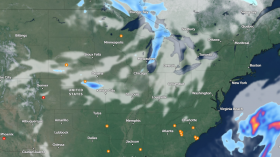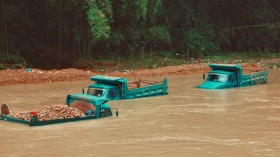The ultra-tough tardigrades can survive in a number of harsh conditions including the vacuum of space and intense radiation. The creature, also known as water bears, is also a water-dwelling animal that's able to endure extremely long periods of dry spells. A new study published in the journal Molecular Cell focused on their ability to combat dehydration with a very special power.
According to a report from New Scientist, tardigrades can spend up to a decade in a shrivelled-up, dormant state when they're exposed to a dry environment. Within an hour of being back in water, these water bears are revived.
The secret to this strange ability is the water bear's unique protein called the tardigrade-specific intrinsically disordered proteins (TDPs). Unlike other known proteins, TDPs are jelly-like in the water and do not become well-defined three-dimensional structures.
It's when water bears are thrust in a dry environment that the proteins transform into a glass-like sanctuary that covers the dehydration-sensitive parts of the tardigrade from danger. This way, the vital molecules to the animal's survival is sheltered until the drought is over.
"When the animal completely desiccates, the TDPs vitrify, turning the cytoplasmic fluid of cells into glass," lead author Thomas Boothby from the University of North Carolina at Chapel Hill explained. "We think this glassy mixture is trapping [other] desiccation-sensitive proteins and other biological molecules and locking them in place, physically preventing them from unfolding, breaking apart or aggregating together."
It was previously believed that tardigrades' immunity to dehydration was due to a sugar called trehalose, which basically performs the same function -- forming glassy cocoons for protection -- in other animals. Boothby cited it as an example of convergent evolution, which is when evolution comes up with similar solutions multiple times.
The team is currently studying if other organisms besides tardigrades can also make use of these proteins during dessication.
© 2024 NatureWorldNews.com All rights reserved. Do not reproduce without permission.
![Great White Sharks Observed for the First Time Changing Their Behavior in Different Marine Environments [Study]](https://1471793142.rsc.cdn77.org/data/thumbs/full/70251/280/157/50/40/great-white-sharks-observed-for-the-first-time-changing-their-behavior-in-different-marine-environments-study.jpg)

![Origin of Life: Discovery of Lava Being a Building Block of Life Hints 'Humans Have Volcanic Origins' [Study]](https://1471793142.rsc.cdn77.org/data/thumbs/full/70262/280/157/50/40/origin-of-life-discovery-of-lava-being-a-building-block-of-life-hints-humans-have-volcanic-origins-study.jpg)


